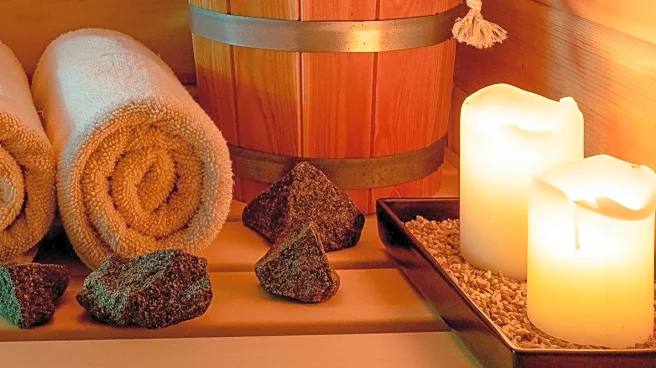What's Happening?
Sauna culture is experiencing a surge in popularity across the United States, with individuals increasingly seeking the health benefits and social connections offered by communal sweating. The trend, which has deep roots in Nordic countries, is now being
embraced by Americans who are installing saunas in their homes and visiting urban sauna clubs. Saunas are reported to improve sleep, blood pressure, brainpower, and longevity, with bookings for sauna sessions ranking high in wellness reservations. The pandemic has contributed to this interest, as people seek immune-boosting practices and ways to connect with others. Saunas are also linked to reduced risks of heart-related diseases and dementia, according to studies from Finland.
Why It's Important?
The growing interest in sauna culture in the U.S. reflects a broader shift towards wellness and health-conscious lifestyles. As more Americans invest in saunas, the potential health benefits could lead to improved public health outcomes, particularly in reducing heart disease and dementia risks. The social aspect of sauna bathing also addresses the loneliness epidemic, providing a space for genuine human connection. This trend could influence the wellness industry, driving demand for sauna-related products and services, and potentially leading to economic growth in this sector. However, the scientific community calls for more research to fully understand the long-term health impacts of regular sauna use.
What's Next?
As sauna culture continues to grow, it is likely that more businesses will emerge to meet the demand for sauna experiences, both in urban settings and private homes. The wellness industry may see increased innovation in sauna technology and design, catering to diverse consumer preferences. Additionally, public health campaigns might incorporate sauna use as part of broader wellness strategies. Stakeholders, including healthcare providers and wellness advocates, may push for more comprehensive studies to validate the health claims associated with sauna use, ensuring that consumers are informed about the benefits and risks.
Beyond the Headlines
The rise of sauna culture in the U.S. may also have cultural implications, as it introduces Americans to a tradition deeply rooted in other societies. This could foster greater cultural exchange and understanding, as people explore the historical and social significance of sauna bathing. Ethically, the trend raises questions about accessibility, as high costs may limit participation to wealthier individuals, potentially exacerbating health disparities. Long-term, the integration of sauna culture into American life could influence lifestyle choices, promoting a balance between physical health and social well-being.















